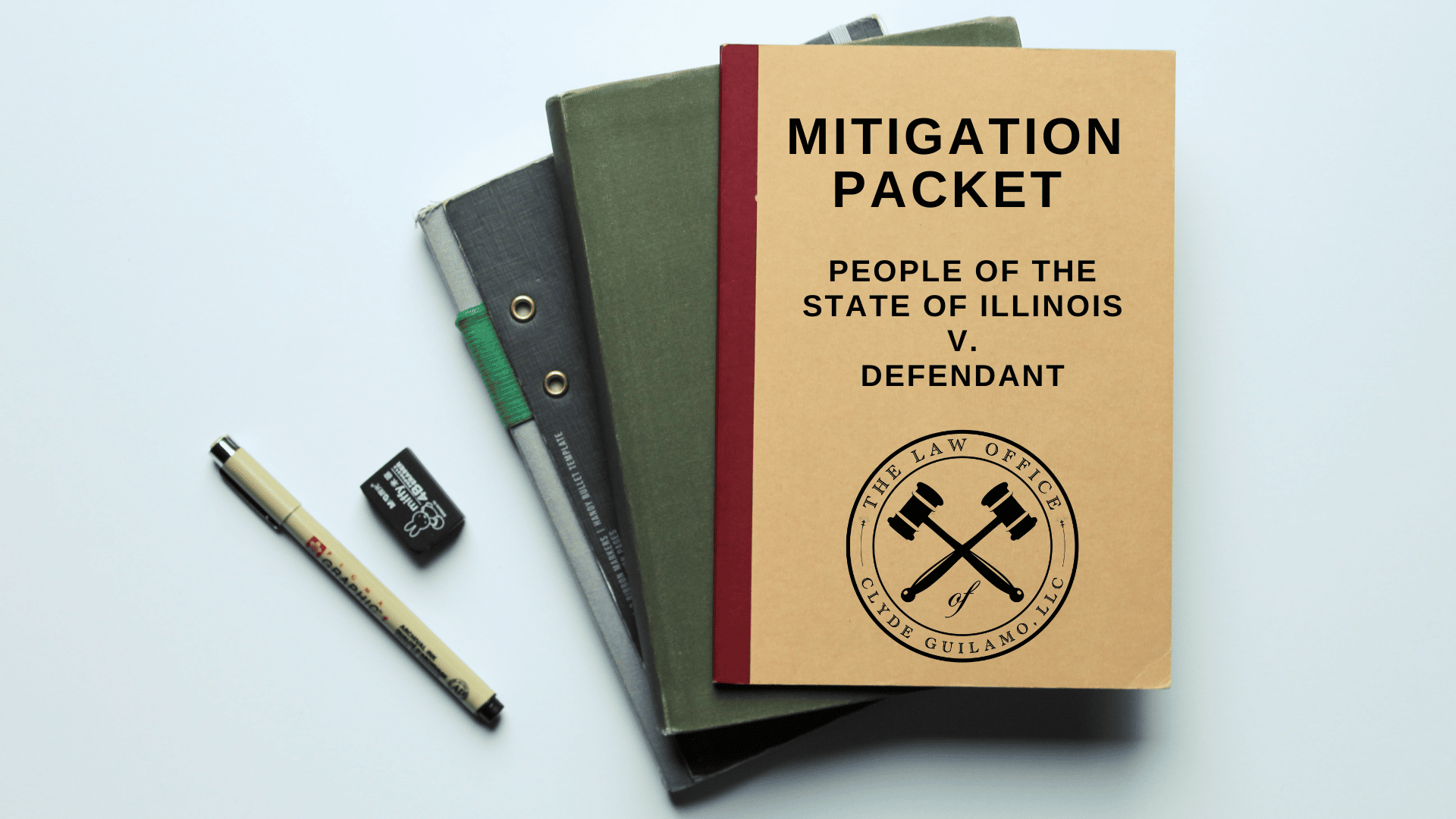
Everything You Need to Know About Mitigation in Criminal Cases
Criminal Defense Lawyer Serving Cook, DuPage, DeKalb, Grundy, Kane, Kankakee, Kendall, LaSalle, Lee, Ogle, and Will Counties
If you have been charged with violating the law, then you may have heard the judge, the prosecutor, or your attorney say the word “mitigation.” It does not matter if your pending case is a felony, misdemeanor, or petty offense, you should talk with a lawyer about putting together a mitigation packet. In this article, Criminal Defense Attorney Clyde Guilamo explains everything you need to know about mitigation in criminal cases. You’ll be able to competently discuss mitigation with your lawyer, but if you are still looking for a lawyer, then call Attorney Clyde Guilamo today for a free consultation.
Table of Contents
| 1. What is Mitigation? |
| 2. What is the goal? |
| 3. When should you provide it? |
| 4. Different examples? |
| 5. Sample Mitigation Packets? |
| 6. 3 Tips? |
| 7. Problems? |
| 8. Other Legal Resources |

What is Mitigation?
Literally, “mitigation” means the act of reducing the severity, seriousness, or painfulness of something. In the criminal system, when we say mitigation, it means presenting proof to the prosecutor or judge explaining why you should receive a better result in your case.
At the beginning of any criminal case, the prosecutor has no idea who you are. The only things that prosecutors have in front of them are your criminal history and the police reports of this incident. We want to humanize you by educating the prosecutor of who you are. We accomplish that, by putting together a mitigation packet.
What is the goal of mitigation?
The goal of providing a mitigation packet is to either:
- Receive a sentence in the lower end of a sentencing range;
- Get a reduction of the charges in the case;
- Get admitted into a deferred prosecution or special probation program; or
- Get a dismissal of one or more charges in the case.
Let me explain each one of those goals in turn.
Low Sentence Within Sentencing Range
Generally, all crimes have a sentencing range. For example, possession of a small amount of a controlled substance is a class 4 felony in Illinois. That crime has a sentencing range of 1 to 3 years in the Illinois Department of Corrections. Prison, however, is not mandatory. Another possible sentence for a class 4 felony is probation. Your lawyer might provide mitigation to the prosecutor to reach a plea agreement of 18 months of probation.
Reduction of the Charges
Many crimes can become a higher-class felony, which carry harsher penalties, if certain conditions apply. For example, theft is generally a misdemeanor, but the class of the offense and the potential penalty will become worse as the value of the thing you stole increases. Your lawyer may present mitigation to the prosecutor in the form of an agreement to compensate the victim entirely for the stolen item. This mitigation may result in the prosecutor reducing the charge from a felony theft to a misdemeanor theft.
Admission into a Deferred Prosecution or Special Probation
In Illinois, you must receive the approval of the State’s Attorney to receive the outcome of second chance probation. This form of probation is great because if you successfully complete the program, your case will be dismissed. That means that you would be able to expunge the case from your criminal record! You would also need the approval of the prosecutor to enter a deferred prosecution program. A defense attorney would present mitigation to the prosecutor so that he or she would agree to you entering the appropriate program.
Dismissal of one or more charges
If you are charged with driving under the influence of alcohol, while a young child is in your vehicle, you could also be charged with Endangering the life or health of a child. While the case is pending, your lawyer will recommend that you engage in DUI and parenting classes. If you successfully complete the classes and obtain certificates, then your lawyer would probably use those certificates as mitigation for the prosecutor. As a result, the prosecutor might have you plead guilty to the DUI and dismiss the endangering the life or health of a child.
When should you provide mitigation?
There are two stages in any criminal case where mitigation is important: 1) during plea negotiations with the State, and 2) at the time of sentencing. Since plea negotiations may happen early on, you should get mitigation over to your attorney as soon as possible. Let’s discuss mitigation’s role in plea negotiations, and then discuss mitigation’s role in sentencing.
Plea Negotiations
In many criminal cases, a prosecutor makes a “plea offer” to the defendant. Stated differently, the prosecutor agrees to recommend a specific sentence if the defendant agrees to plead guilty. Since crimes can have a large sentencing range, many defendants choose the known outcome offered by the State instead of the unknown outcome if left to the judge. During plea negotiations the prosecutor can agree to:
- A sentence in the lower end of a sentencing range;
- A reduction of the charges in the case;
- Admission of the defendant into a deferred prosecution or special probation program; or
- A dismissal of one or more charges in the case.
Since there are so many things a prosecutor can do, defense attorneys usually provide mitigation and request a specific outcome. Requesting a specific outcome is usually called, a “counteroffer.”
Sentencing
In Illinois, there are two times in any criminal case where the judge can consider the sentence that the defendant can get: 1) During a 402 conference; and 2) at a sentencing hearing.
A 402 conference is a pre-trial conference with the judge in which the judge is made aware of the pending plea negotiations between the defendant and the prosecutor. The judge essentially serves as a mediator in the discussion and can recommend a specific sentence. Your lawyer should have all the mitigation materials ready for the judge before he or she enters the 402 conference.
If the judge or jury finds you guilty, then the case will be continued for a sentencing hearing. At the sentencing hearing, your lawyer should provide mitigation so that you can either 1) receive a sentence on the low end of the eligible sentencing range; or 2) admit you into a specialized program.
Plea Negotiations vs. Sentencing
This is a good time to explain powers that only the prosecutor has. Only the prosecutor can:
- Reduce a charge; and
- Dismiss a charge.
In a 402 conference, a judge cannot reduce an armed robbery to a robbery, or a residential burglary to a burglary. The power to offer a reduced charge resides with the prosecutor.
Also, the judge cannot dismiss a charge in a 402 conference. If you only want to plead to one charge and not the other, that is not something that the judge can recommend in a 402 conference. Thus, if your goal is to reduce or dismiss a charge, then the mitigating circumstances must be presented to the prosecutor in plea discussions.
What are different examples of mitigation?
There are many things that can count as mitigation. Here some items that I have used in the past, as mitigation:
- Completion of a treatment program (i.e., drug, anger management, parenting);
- Employment that serves the community (i.e., teachers, police officers, firefighters);
- A Lack of Criminal History;
- Military Service (i.e. active deployment, awards, honorable discharge);
- Letters from prominent members of our community (i.e. pastors, politicians, celebrities);
- Coaching a sport’s team (i.e., a team photo, a clip out of a local paper, a website);
- Mentoring a child (i.e., Big Brothers/Big Sisters, YMCA, MindsMatter);
- You have a medical condition that would worsen if incarcerated;
- You have complied with all pre-trial conditions;
- You have an intellectual disability, or have serious mental illness;
- You suffered abuse which explains your current charges;
- Engagement in a church (i.e., deacon, parking attendant, Sunday school teacher);
- Community Service or Volunteer work (i.e., soup kitchen, street cleaning, shelters);
- Acknowledging the wrongdoing, and/or making the victim whole (i.e., apology letters, paying the victim’s medical expenses, paying restitution);
- Caregiving, especially for someone with a disability (i.e., cancer-patient, elderly parent, young children; relatives with down syndrome);
- Enrollment in school (i.e., College, Nursing Program, Trade School);
- Donations to a 501(c)(3) org. (i.e., Red Cross, March of Dimes);
- Proof of Fulltime Employment (i.e., paystubs, badges, and/or I.D.’s);
This list does not include everything. Feel free to ask your lawyer if any activities that you engage in would count as mitigation.
Sample Mitigation Packets
| 1. Sample Mitigation Packet for a person who is charged with Possession or Delivery of a Controlled Substance: a. Letter from the attorney on the case (Outline of the Packet); b. Substance Abuse evaluation completed by the client; c. Certificate for completion of In-patient drug treatment; d. Progress Report or Letter from your current outpatient provider; e. Copy of your paystub showing that you are actively employed; f. Certificate of completion of Parenting Class; g. Photo of you and your family; and h. Letter of support from a family member or pastor. |
| 2. Sample Mitigation Packet for a Person with a CDL who is charged with a D.U.I.: a. Letter from the attorney on the case (Outline of the Packet); b. DUI evaluation completed by the client; c. Certificate for completion of DUI treatment; d. Copy of your CDL license; e. Copy of your paystub showing that you are actively employed as a trucker; f. Photo of you with your truck; g. Photo of you and your family; h. Character Letter of support from a family member or boss; i. Letter documenting your completion of community service hours; and j. Letter of support from your counselor at your Alcoholics Anonymous (AA) meetings. |
| 3. Sample Mitigation Packet for a person who is charged with Domestic Battery or Aggravated Domestic Battery: a. Letter from the attorney on the case (Outline of the Packet); b. PAIP (Partner Abuse Intervention Program) evaluation completed by the client; c. Certificate for completion of PAIP classes; d. Photo of you and your family; e. Letter from victim showing support and acknowledging the progress that you have made; f. Paystub from your current employer; g. Certificate of completion of parenting classes; h. Character Letter of support from a family member or boss; i. Letter documenting your completion of community service hours; j. Letter of support from your counselor at your Alcoholics Anonymous (AA) or Narcotics Anonymous (NA) meetings; |
Remember, these are just examples. Your mitigation packet may contain more or less information. If you still have questions, then you should talk with your lawyer.
3 Tips for putting together a Great Mitigation Packet
- Review your weekly schedule while thinking “does this count as mitigation?” This should be your first step in determining if there is anything that you can offer as mitigation. A photo of you engaged in those activities or a receipt or paystub would be an excellent item to put into your mitigation packet.
- As you review your schedule, determine if you come into contact with someone who could write a letter of support. Maybe a teacher or sponsor would write a character letter for you. Character letters can also be written by your spouse, your parents, or your children.
- If you have nothing to provide as mitigation, it’s time to get busy! Most cases last several months, which is enough time for you to make progress in treatment or engage in community service. You need to give your lawyer the reasons to use when asking for the best possible outcome. All arguments are better when they are based on evidence!
3 Common problems with providing mitigation?
- Uncertainty. “If I do the drug treatment, then will I get probation instead of prison” is a very good question. Unfortunately, the answer may be “I don’t know, but it’s our best shot at probation.” Defense attorneys present mitigation to prosecutors and judges hoping to get a better result for their clients. We test the waters by informing the prosecutor or judge that our clients are engaged in certain classes or completing certain evaluations and asking for time for our clients to make progress. We hope that prosecutors will pull us aside and tell us if it’s a waste of time, but prosecutors sometimes fail to tell us.
- No Benefit. That’s right, you could do 300 hours of community service, hoping to get a better resolution. And then the prosecutor says that they don’t care, the initial offer stands. Ouch! Unfortunately, the more serious the crime is, the less impact mitigation may have on your case.
- Wrong Outcome. You just submitted a 30-page mitigation packet, and it moves the prosecutor to budge from their original position. Instead of the 10 years IDOC they were initially offering, they come down to the minimum prison sentence of 6 years IDOC. You, however, were hoping for probation. Ouch, again! Let me be clear: just because you provided mitigation does not mean that you will get your requested result.
Good Luck on putting together your mitigation packet! If you found this article helpful, consider giving us a review on Google!
Other Legal Resources
If you are looking for information about:
- Domestic Violence Cases, then check out our Domestic Violence guides.
- Drug Cases, then check out our Drug Crime guides.
- DUI/Traffic Cases, then check out our DUI guide.
- Gun Cases, then check out our Gun Crime guides.
- Sex Cases, then check out our Sex Crime guides.
- Theft Cases, then check out our Theft Crime guides.
- Violent Cases, then check out our Violent Crime guides.
Hire Criminal Defense Attorney Clyde Guilamo
Lastly, I hope this guide of free legal education was helpful. #notlegaladvice. If you have specific questions about your case, then call me today for a free consultation:


